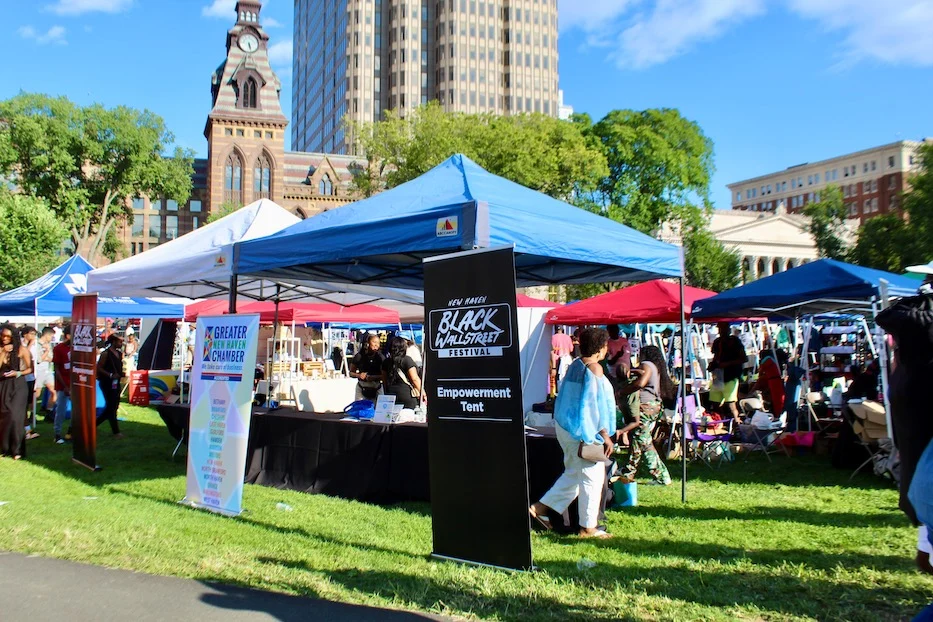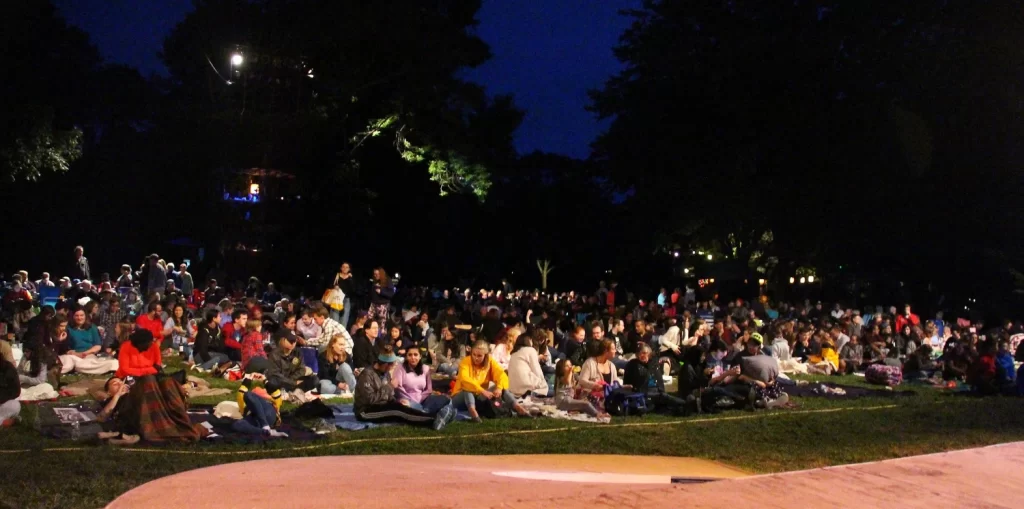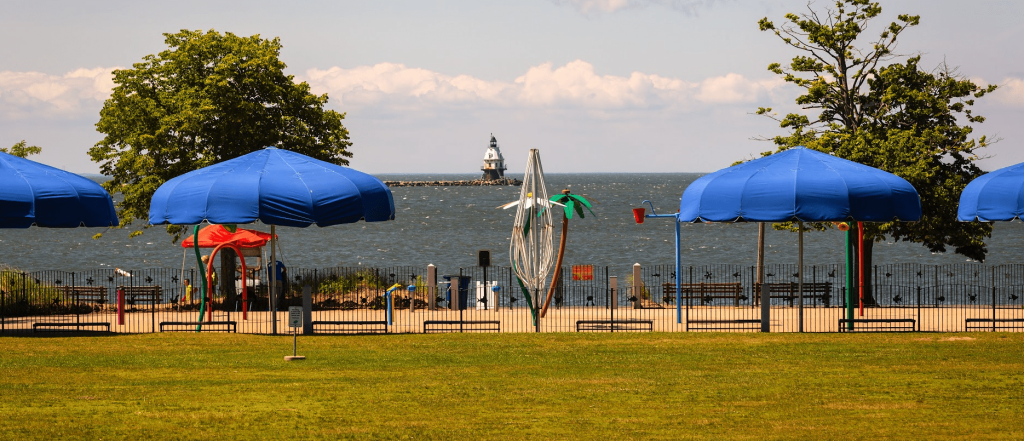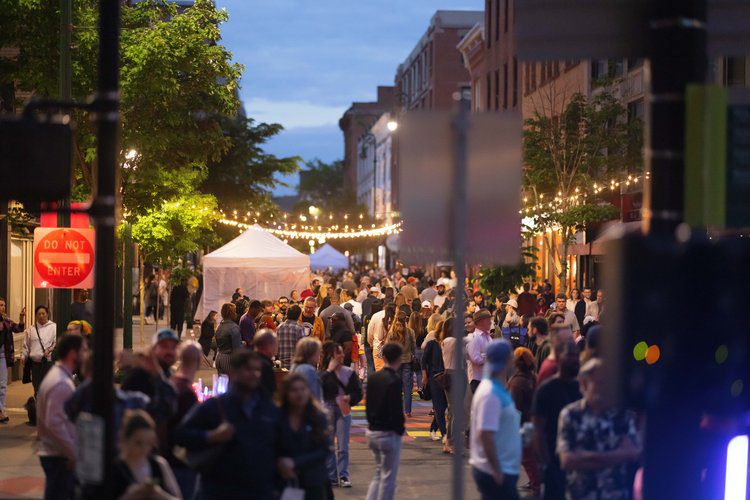29th Colored Regiment Monument – 287 Chapel St.
At Criscuolo Park, this monument honors the soldiers of the 29th Connecticut Infantry Regiment, one of the first African American units raised in the North during the Civil War. More than 900 soliders trained on this ground in 1863. Today, the site offers a reflective stop along the riverfront.
Amistad Memorial – 165 Church St.
In front of New Haven City Hall, Ed Hamilton’s bronze sculpture commemorates the 1839 Amistad uprising and the legal battle that followed. The memorial depicts key figures from the case and marks one of the most significant freedom stories connected to the city.
Churches on the New Haven Green
Center Church on the Green – 250 Temple St.
Established in 1639, Center Church stands at the heart of the original colony. The current meetinghouse, built between 1812 and 1814 in the Federal style, sits directly above the early burial ground. The Crypt below preserves centuries of New Haven history in its original setting.
Trinity on the Green – 230 Temple St.
Facing the New Haven Green, Trinity on the Green is one of the city’s landmark Episcopal churches. Built between 1814 and 1816, it is a defining example of early Gothic Revival architecture in the United States. The church is known for its music, visual arts, and community outreach, which together reflect its long tradition of connecting faith with public life.
United Church on the Green – 270 Temple St.
United Church, part of the United Church of Christ, traces its roots to New England’s early Congregationalist tradition. The congregation has long been active in social justice, with notable contributions to abolition, civil rights, and advocacy in the public square. The church faces the historic Green.
Edward A. Bouchet Memorials – 769 Ella T. Grasso Blvd.
Across the city, memorials recognize Edward A. Bouchet, the first African American to earn a Ph.D. in the United States (Yale, 1876). A mural on Chapel Street, a headstone at Evergreen Cemetery, and several Yale designations honor his legacy of scholarship and achievement.
Freedom Schooner Amistad – 475 Long Wharf Dr.
Docked at Long Wharf, the Freedom Schooner Amistad is a full-scale replica of the 19th-century vessel tied to the Amistad case. Operated by Discovering Amistad, the ship offers educational programs and seasonal public tours that explore themes of justice, human rights, and maritime history.
Goffe Street School – 106 Geoff St.
Built in 1864, the Goffe Street School served African American students during an era of segregated public education in Connecticut. After its closure in 1874, the building remained an important community hub. It is listed on the National Register of Historic Places.
Grove Street Cemetery – 227 Grove St.
Opened in 1797, Grove Street Cemetery is one of the nation’s earliest organized burial grounds with family plots and marked avenues. Its Egyptian Revival gateway dates to 1845, and the grounds include the resting places of educators, inventors, and community leaders. The cemetery is open to visitors.
New Haven Museum – 114 Whitney Ave.
Founded in 1862, the New Haven Museum shares the city’s history through exhibitions, archives, and programs. Galleries explore topics from the region’s founding to its cultural and industrial development. It’s a natural starting point for understanding New Haven’s past.
St. Mary Church – 5 Hillhouse Ave.
St. Mary Church, established in 1832, is New Haven’s oldest Catholic parish. The current Gothic Revival building on Hillhouse Avenue was completed in 1874 and is known as the birthplace of the Knights of Columbus, founded here in 1882 by Father Michael J. McGivney. The church remains an active parish and historic site.
Soldiers’ and Sailors’ Monument (East Rock Park) – 41 Cold Spring St.
Standing on the summit of East Rock, this 1887 monument honors New Haven residents who served in the Revolutionary War, the War of 1812, the Mexican–American War, and the Civil War. The overlook offers some of the best views of the city and Long Island Sound.
Walk New Haven Tours – online
Walk New Haven’s self-guided tours highlight the cultural heritage of the city through stories curated by the Ethnic Heritage Center. Routes explore the experiences of Jewish, Italian, Ukrainian, Irish, and African American communities before 1970. Each path offers a deeper look at New Haven’s diverse history.





